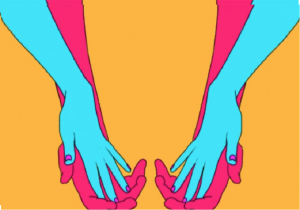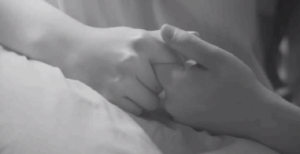Why Do We Hold Hands?

The majority of us don’t give our inclination to hold hands with our loved ones much thought. What more could we want for? It feels good, their hands fit well with ours, and we can move in the same direction while remaining physically attached. However, the instinct has actually sparked a good deal of scientific curiosity. Scientists are curious to discover the origins of the custom, if it has any psychological or physical advantages, and why we hold hands rather than using any other part of our bodies. For example, why don’t we all go around touching our elbows and hips? And instead of trying to establish new ties with strangers, why do we hold hands to show a strong bond with someone we already care about?
Even while we might not think of it that way, holding hands turns out to be just as much a social and psychological act as it is a physical one. Globally, there are significant cultural variations in the meanings attached to hand-holding between friends and romantic partners; anthropologists frequently observe that, in certain cultures, such as South Korea, young women’s hand-holding is not considered romantic. More concerningly, hand-holding behaviour also reflects many of the ideas about power and dominance that are present in relationships. A 2013 study of people holding hands on the beach in South Carolina found that, regardless of height, men were far more likely to be “dominant” (holding their hand above women) in hand-holding, and women were more likely to be dominant over children. It turns out that squeezing someone’s hand is rarely an easy task.
Thus, why do we hold hands in specific circumstances, what effects does it have on us, and what does it suggest about the range of human interaction and communication in general? Let’s examine the scientific and psychological context of this seemingly commonplace conduct.
1. It Increases Pain Resistance And Lowers Stress

Two of the hand-holding studies that are most frequently cited concentrate on examining what occurs when individuals in relationships experience pain—a study that would have been very interesting to me when I was single. The first, carried out in 2006, examined stress management, and the second, carried out in 2009, examined pain and our perception of it. When combined, they paint an intriguing picture of the practical and physiological significance of hand-holding.
Researchers from the University of Virginia conducted the 2006 study, which included 16 contentedly married heterosexual couples in their thirties as test participants. The spouses’ wives were fitted with devices that shocked them electrically on the ankles, and the researchers monitored the activity in the areas of their brains related to threat perception. That area of the brain fired up when they were told there would be a shock, but it was noticeably less active while they were holding hands with their partner. It was essential to have familiarity with the person on the other end of the clinch for this to function while holding hands with them alone.
The second study was carried out in 2009 and was slightly different. Once more, the entire focus was on the responses of women; in this instance, the subject was 25 young ladies who had been happily married to men for a long time. A University of California research team administered light burns to them in a variety of ways, and they were asked to rate how uncomfortable they felt. The presence of their partner appeared to have a “anaesthetic” effect on them, whether they were holding hands or gazing at a picture of each other; the ladies felt less strong physical stimuli, but it wasn’t any less unpleasant for them.
We should be aware of a few things about these studies before attempting to apply them to our own life. Above all, it is crucial to keep in mind that these research were limited to women in heterosexual relationships. It’s possible that same-sex partners’ brain responses are similar to those of men, but they haven’t been taken into consideration yet. They also don’t address the purpose of why we hold hands, instead focusing instead on the many possible benefits of doing so. It does, however, explain why humans resort to hand gripping in specific situations, such as tense or frightening ones that could cause discomfort, either physically or emotionally. We probably have something to do with the fact that when we hold hands, our levels of oxytocin, the “cuddle chemical,” increase and we react positively to contact and pressure during stressful moments.
2. It Is Associated With A Specific Pressure Point

The Wall Street Journal reported on a particularly intriguing finding regarding the hands: there is a pressure point in the hand that is located between the thumb and forefinger. It may be able to alleviate really acute pain, however the exact mechanism behind this is yet unknown.
The 2011 study on the hegu point, one of the most important acupuncture points, was covered by the Wall Street Journal. The ancient Chinese traditional medicine practise of acupuncture includes the insertion of needles at certain pressure points on the body to treat a variety of illnesses. Instead than focusing on romantic handholding, the researchers studying the hegu point at the University of Maryland and Johns Hopkins University School of Medicine were attempting to determine whether the hegu point could be helpful in reducing extreme pain for specific cancer patients.
The cancer patients they treated were receiving extremely painful procedures known as “bone marrow aspiration,” and for no apparent reason, they were receiving acupuncture at the hegu point or at another location on the hand. There was a reduction in pain among those who were truly suffering during the operation, but there was no improvement for those who were simply experiencing typical pain levels. This might provide some insight into the particular mechanisms underlying hand-holding comfort, but as of right now, we don’t know exactly how the hegu point functions.
3. The Skin On Your Hands Is Extremely Sensitive

The fact that our hands are such delicate tissues is one of the reasons we tend to hold hands by default rather than, say, putting our arms together or gripping each other’s hair. In a moment, we will get into the specific reactions to touch in human physiology and psychology, but for now, let’s just say that hands are a great place to start when we want to contact each other in a way that truly fires the nerve endings.
The idea that the hand’s high density of nerve endings—so many, in fact, that two needles touched just millimetres apart can be detected as two separate points—gives it primacy as a mechanism for touch, and that our dependence on our hands throughout our evolutionary history may be linked to the value we place on palm-to-palm and finger-to-finger contact, was presented to the Albion Pleiad by biology professor Eric Rabquer. In essence, he suggests that because our hands have developed a vast array of nerve endings to aid in tool usage, threat avoidance, and complex job execution, we have come to rely on them as emotional tools as well. Though this is a theory that is unlikely to be validated, it’s intriguing to consider the possibility that our hand-holding behaviour has roots in our very remote evolutionary history.
Touch Speaks Its Own Tongue

We now understand that all forms of touch, from nose-to-nose to a fleeting scratch on an uncovered arm, are incredibly beneficial to humans and that being completely touch-free is extremely damaging. Mentality Many intriguing facets of touch’s significance to human psychology and health are being explored in depth by modern research, such as the well-known University of California Berkeley study that revealed the NBA teams with the most on-court physical contact received the highest ratings. However, one factor stands out as being very important when it comes to handholding: touch is a highly effective means of communication.
It turns out that, whether couples are conscious of it or not, physical contact and holding hands may transmit enormous volumes of emotional data. According to Psychology Today, in 2009, Professor Matt Hertenstein gave touch-based communication its first significant scientific boost. He had blindfolded volunteers try to communicate different emotions to strangers using only touch, and to his surprise, he discovered that they “got the message” 75% of the time. It appears that handholding is just one of many different touch-based communication strategies that people use, whether they are with a significant other, family, or complete strangers.
The Knowledge Is Acquired At An Early Age

When did we start holding hands together? The charming tendency of very little babies (sometimes in the womb) to react to the contact of fingers by clutching them tightly is known as the palmar grab reflex, and primates of all sorts exhibit the same inclination, as noted by The Huffington Post. This reaction is known to occur as soon as we are born.
The people who hold our hands in early life are all carers, parents, grandparents, people who help us cross the street, or classmates when we’re walking down the street in pairs. This is a valid psychological thesis, though it hasn’t been proven to influence our actions or assessments of affection in the future. It’s not a hard psychological leap to associate holding someone’s hand with safety and care; it’s just a simple method to express love and security to someone else, just like it was conveyed to us as kids.
Source: hnsviral.com
DISCLAIMER: THIS WEBSITE DOES NOT PROVIDE MEDICAL ADVICE The information, including but not limited to, text, graphics, images and other material contained on this website are for informational purposes only. The purpose of this website is to promote broad consumer understanding and knowledge of various health topics. It is not intended to be a substitute for professional medical advice, diagnosis or treatment. Always seek the advice of your physician or other qualified health care provider with any questions you may have regarding a medical condition or treatment and before undertaking a new health care regimen, and never disregard professional medical advice or delay in seeking it because of something you have read on this website.
